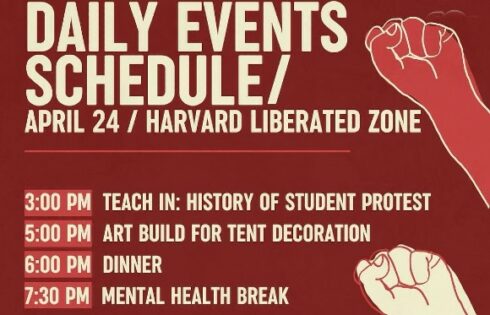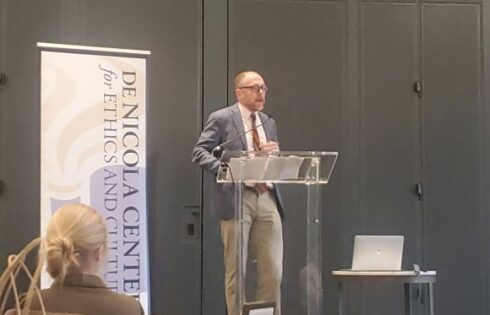
Stuart Hurlbert, a San Diego State University professor emeritus of biology, has come under fire from both a faculty resolution and a petition from the university’s biology graduate student union.
Hurlbert has been an outspoken supporter of immigration restrictions and a critic of universities’ catering to the Black Lives Matter movement.
SDSU’s Biology Graduate Student Association drafted a petition calling for the revocation of Hurlbert’s emeritus status. It currently has over 550 signatures and states that for years the campus biology community “has been plagued by one particular agent of intolerance, SDSU emeritus professor Dr. Stuart Hurlbert.”
The petition was initiated in early June. Next, a resolution was considered by the SDSU University Senate’s Academic Policy and Planning Committee that would allow the senate, provost or president to revoke a professor’s emeritus status if their conduct “causes harm to the University’s reputation.”
The resolution was approved and is now under consideration by other committees within the faculty senate. A full vote of the senate may come this fall.
While the university denies the resolution has anything to do with Hulbert, many disagree.
“Only academics could come up with a resolution that is so naive and diabolical at the same time,” Hurlbert told The College Fix. He compared the proposal to those found in Russia, China or other dictatorships.
Hurlbert said via email he believes the resolution “was developed and is being rushed through primarily to put me down.”
Other SDSU faculty members have criticized the proposal.
SDSU English Professor Peter Herman published an op-ed in the Times of San Diego where he raised similar concerns to Hurlbert’s, including the resolution’s similarity to those of tin-pot dictatorships. Herman also attacked the broad standard of “causes harm to the University’s reputation.”
“Publishing an op-ed revealing a foolish policy proposal will likely not enhance SDSU’s reputation. What about the op-eds I published about how SDSU nearly invited a vicious anti-Semite to campus? Or the one about President Adela de la Torre’s wasteful spending habits? Do these together put emeritus status out of reach for me?”
Herman references a piece he wrote which criticized the university’s invitation to Ava Muhammad, a spokesperson for Louis Farrakhan, to a summit on reparations. Herman calls both Muhammad and Farrakhan “viciously anti-Semitic.” The university later disinvited Muhammad due to backlash.
Herman also objected to the fact that the accused’s only form of defense is a written statement given to the faculty senate executive committee.
As the San Diego Union-Tribune reports, SDSU sociology Professor Mike McCall also wrote to his colleagues that the proposal’s language “is so appallingly vague it ought not have received a second of thought among academics, let alone seemingly be making its way through the policy consideration process.”
And Peter Atterton, chair of the faculty senate’s Constitution and Bylaws Committee and a professor of philosophy, sent a memo to the full SDSU faculty senate encouraging its members not to vote for the resolution.
“I believe that such a policy poses a serious threat to academic freedom of expression and has the potential to silence unpopular faculty voices,” he wrote in an email, which Hurlbert provided to The Fix.
The new language of academic censorship is protecting "university values and professional dispositions" from viewpoints not au courant in the faculty lounge. "We believe in academic freedom but…" Got Azerbaijan? #academicfreedom @NASorghttps://t.co/eOmBDuxjgY
— Bruce Gilley (@BruceDGilley) July 20, 2020
The College Fix contacted SDSU’s chapter of the California Faculty Association, their teachers’ union, but it did not respond to repeated requests for comment.
An SDSU administration representative, however, said he believes that the resolution has been misrepresented by critics.
“Unfortunately, the information presented in the recent news coverage is grossly inaccurate and also does not accurately reflect the proposal or the University Senate’s process,” the spokeswoman told The Fix. “To provide needed clarification, the policy has not been approved and has not become formal institutional policy.”
The spokeswoman also disputed Hurlbert’s claims that the resolution was drafted with him in mind.
“The drafted, preliminary policy language is not in response to any one individual, but rather in response to lapse in existing policy. Currently, there is no way to revoke emeritus status should an emeritus faculty, staff or administrator violate university policy or commit a criminal act.”
Additionally, the language that is currently in the proposal may not be the same in its final iteration.
“Drafted by the SDSU Academic Policy and Planning Committee,” the spokeswoman said, “the language requires review by the Senate Executive Committee.”
“As part of the University Senate process, it may then be referred back to the AP&P committee, and/or other Senate committees, for further review before being brought to the full university senate in Fall for a vote.”
Still, as Professor Herman states in his op-ed: “This proposed policy was approved with no opposition by an email vote of AP&P, with all current members of the committee participating.”
If the current support in the Academic Policy and Planning Committee is any indication, the resolution may have a good chance of passing.
It certainly has the support of many grad students, as SDSU’s Biology Graduate Student Association petition to revoke Hurlbert’s status includes a timeline of Hurlbert’s supposed “history of racism, xenophobia, and departmental harassment.”
The timeline catalogs instances dating back to 2006. Chief and most common on the list of grievances is Hurlbert’s aforementioned support for immigration restrictions.
Also objectionable was his claim that The New York Times and the Southern Poverty Law Center are part of a Goebbelsian propaganda campaign due to their propensity to label mainstream conservatives as racist.
BGSA did not respond to The Fix’s request for comment.
Hurlbert came out swinging against the claims in the petition.
He called for the BGSA to be sanctioned “for its naive, defamatory and falsehood-ridden petition.”
“If [the University] supports the BGSA and initiates more star chamber proceedings against me I think they will have a public relations train wreck on their hands. It can try that regardless of whether the proposed policy is approved or not,” he said in his email.
He told The Fix that he does not believe the petition will be successful because “I have a pretty good reputation, locally, nationally and internationally, for both my science and my integrity. I expect it will take a battle if the university wants that, but I would expect to win.”
The National Association of Scholars, a center-right group, wrote in support of Hurlbert which denounced the “illiberal progressives” that have tried to silence him.
Hurlbert provided The Fix with a thread of three emails which he sent to SDSU administrators, including the biology department chair, the dean of the College of Science, and the university provost.
He informed them of the recent NAS article and requested that the resolution of the BGSA petition be overseen by the SDSU Council of Chairs, “as they are the least politicized and most democratic of all bodies on campus representing the faculty.”
The administrators did not respond to Hurlbert.
Instead, he claims, “Without notice to me or explanation, some administrator has prevented me from defending myself against a vicious attack by biology grad students by preventing my use of the group email addresses for biology faculty and grad students.”
Hurlbert is currently preparing a rebuttal to the claims made in the BGSA petition, but he says this measure from the university impedes his ability to publicize it.
The matter boiled over when administrators continued to ignore him. Hurlbert then CC’d reporters from various media outlets, including The College Fix, onto the thread.
“This will make it easy for you to notify California and the U.S. the moment you decide to undo what has been done and is being done to me, and avoid great damage to SDSU’s reputation. I provide the trumpets, you provide the tune. Time is working against you. This horse is well out of the barn, way down pasture and heading for the fence,” he declared to administrators.
“Free speech at SDSU has, in my 50 years experience here, never been in such bad shape as it is now,” he told The Fix. “Much of the authority over faculty hiring has been transferred from the professors themselves to the ‘diversity, equity and inclusion’ bureaucrats.”
MORE: Diversity and inclusion monitors to join faculty hiring committees at SDSU
Meanwhile, Hurlbert’s supporters watch the situation closely.
Kevin Lynn, executive director for Progressives for Immigration Reform, told The College Fix via email “This is the death of scholarship!”
Additionally, Hurlbert said that about a dozen faculty members have sent him messages of support and that many had responded positively to the NAS article.
In addition to NAS, another national organization has come to Hurlbert’s aid.
The Foundation for Individual Rights in Education, or FIRE, sent a letter to Wil Weston, the chair of the SDSU faculty senate.
“While some may find Hurlbert’s emails or views to be noxious, obnoxious, or deeply offensive, his speech is clearly protected by the First Amendment,” wrote Adam Steinbaugh, director of FIRE’s Individual Rights Defense Program.
Steinbaugh pointed to Rodriguez v. Maricopa County Community College, a case adjudicated by the Ninth Circuit Court of Appeals. The case dealt with faculty members’ suing the titular college for refusing to discipline a professor after he sent out racially charged emails.
The court held that a professor’s listserv represents a platform of protected speech.
Chief Judge Alex Kozinski wrote in his opinion that the “desire to maintain a sedate academic environment . . . [does not] justify limitations on a teacher’s freedom to express himself on political issues in vigorous, argumentative, unmeasured, and even distinctly unpleasant terms.”
Thus, because an emeritus status at SDSU entails “specific and well-defined benefits,” such as access to a lab, office, and library for the purpose of conducting research, Hurlbert may have legal recourse under the First Amendment.
Hurlbert is no stranger to outrage from the SDSU administration. The NAS article details how Bonnie Zimmerman, the now-retired vice president of academic affairs, prohibited him from using his university email to promote political causes, something which countless professors do.
MORE: UC Davis professor under fire for opposing required ‘diversity statements’
MORE: Trouble brews at San Diego State under its first female, Latina president
IMAGE: Roman Samborsky / Shutterstock
Like The College Fix on Facebook / Follow us on Twitter





Please join the conversation about our stories on Facebook, Twitter, Instagram, Reddit, MeWe, Rumble, Gab, Minds and Gettr.